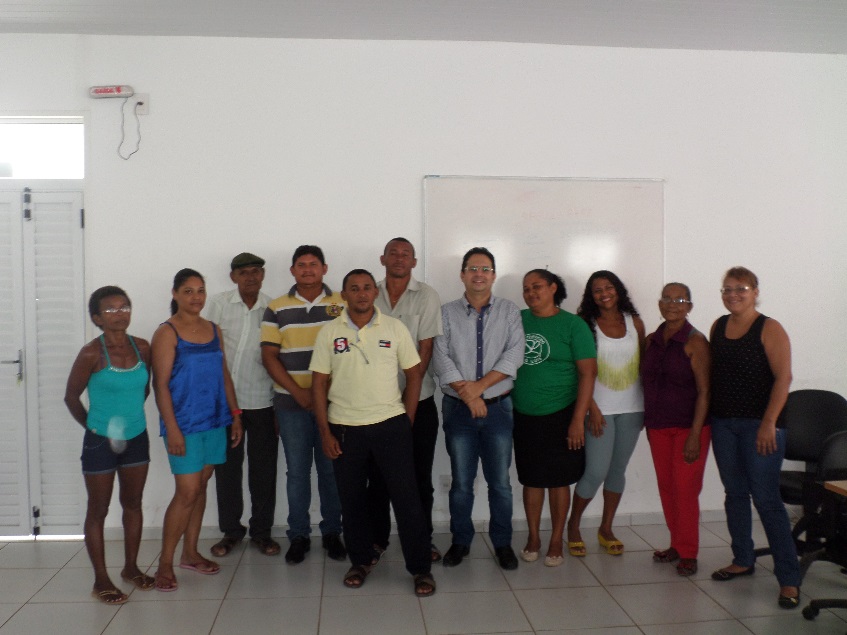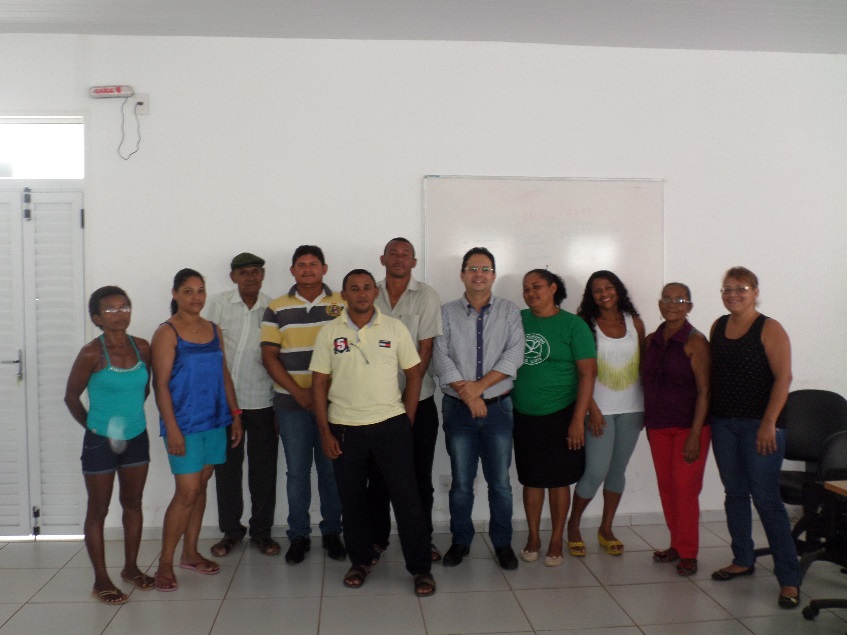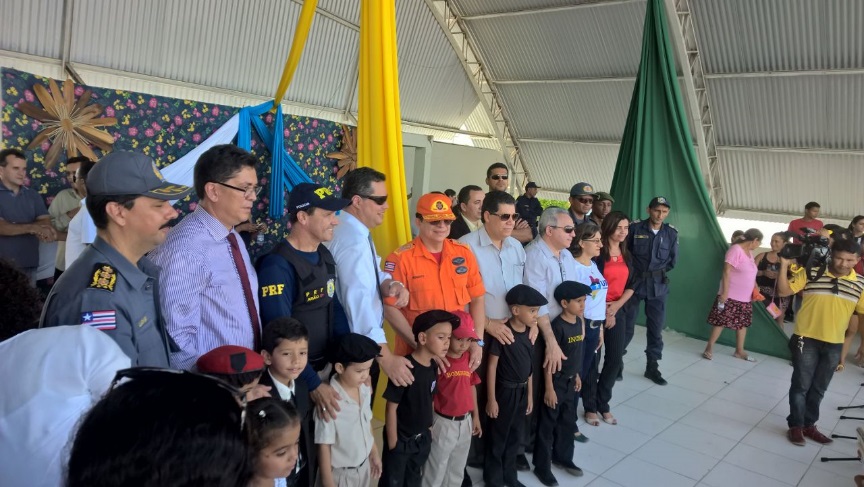Program Pact for Peace (Pacto Pela Paz) . SDG 16
Description
The Pact for Peace was enacted to promote and support the efforts of public institutions, civil society entities and citizens, with a view to reducing violence and spreading a culture of peace, respect for laws and human rights.<br />
Community Peace Councils were set up, which are Voluntary Cooperation Associations made up of people from the same community who come together to discuss and propose joint solutions to problems related to security and other social rights, in order to promote a Culture of Peace, with respect to Laws and Human Rights, always motivated by social pacification.
The Pact for Peace is articulated and debated at the local level by the Community Peace Councils - CCPs. The purpose of these activities is to:<br />
- Promote an approximation between the police institutions and the community, strengthening ties and transmitting more confidence and feeling of security to the population;<br />
-To evaluate actions of public security organs for the benefit of the community;<br />
- Discuss with the community the problems related to public security and social rights that impact on the issue, in order to seek solutions and forward the demands to the competent bodies.<br />
The initiative for the creation of a CCP may start from the community, the Secretariat of State for Public Security or the Secretariat of State for Human Rights and Popular Participation, through awareness-raising, mobilization and training meetings, with the obligatory participation of both mentioned Secretariats, as well as others that are invited in the light of the reality of each community.<br />
It is important to remember that each council will consist of at least 07 (seven) and a maximum of 25 (twenty five) members of the community.<br />
The functions performed in the CCP shall not be remunerated but shall be based on a voluntary service rendered to the benefit of the community.<br />
Community Peace Councils are channels of popular participation in issues related to Public Security and Human Rights in the broadest sense. They have consultative character and can be constituted by municipality, neighborhood or community.
-Through civic-social actions (ACISOS) promoted according to the suggestions of the respective CCPs, more than 22,000 (twenty-two thousand) have already been attended by the Pact for Peace;
-With the promotion of the preventive actions of the Patrulha Maria da Penha, through lectures and meetings.
-Through public policy actions implemented by the other public agencies before the dialogues of the respective community meetings.
The Pact for Peace was a program created by the Government of Maranhão through Law No. 10,387 of December 21, 2015, whose purpose was and is to promote social peace, culture of human rights and respect for laws.
It was implemented through the institution of Community Councils for Peace and provides, within the scope of Public Security, actions to promote the well-being of the population through the implementation of a local police, with local problem-solving, as well as to promote indicators of crime based on qualified police action.
In the social sphere, the Pact foresees social prevention actions aimed at the population of areas identified as critical in terms of crime, in order to reaffirm rights and provide access to essential public services (ACISOS-civic-social actions).
In this context, actions related to the prevention, treatment and social reintegration of users of psychoactive substances are highlighted.
-The Civil Police, more precisely the SENARC, was the first in the Northeast in the specialized states, which seized more illicit drugs in the year 2017. There were over seven thousand kilos, almost 70 (seventy) times greater compared to the year 2014.
- The homicide rate in Greater São Luís (which corresponds to the capital and municipalities of São José de Ribamar, Paço do Lumiar and Raposa), fell by 40.65% in 2017, compared to 2014. This result, quite satisfactory; São Luís, capital of Maranhão, left the list of 50 (50) most violent capitals in the world;
-In 2018, the 63% reduction in homicide crimes and Intentional Lethal Violent Crimes;
- Creation of a specific Law, removing the terminology "security", because it understands that Public Security is the duty of the State, but, right and responsibility of all (constitutional principle). Current CCPs, unlike previous CCPs, are concerned with public policies within their constituency areas and seek to prevent improvements to their respective communities;
-Other quite satisfactory data, apart from the number of free services provided to the communities that received the Civic Social Actions, promoted by the SSP and other Secretariats through the Pact for Peace Program. In total, 22,416 (twenty-two four hundred and sixteen) ;
- It is also worth mentioning that with the adaptation of the "Identity in the community" program, there were 9,467 (nine thousand four hundred and sixty-seven) visits, in the issuance of Identity Cards with the use of the Identity Int. Mobile Unit in the cities of São Luís, Buriti Bravo, Parnarama, Quarreiras, Itinga and the Town of Santana, Caxias, Imperatriz, Matões, Strait, New Hill, Penalva, Nina Rodrigues, Presidente Juscelino, Saint John the Baptist, Santo Amaro, Saint Helena, Mirador, Tutoia, Brejo, Arame, Anajatuba, Santana do Maranhão.
-The Pact for Peace program, through the agreement signed between the SSP and SENAI / SESI, attended in various professional courses (from 2016 to the first four months of 2018), totaling 768 (seven hundred and sixty-eight) young graduates.
Negative point:
- Some people (less and less, of course), who attend to the call of the Councils, expect it to be remunerated, and, as it is not, give up in the middle of the road, temporarily and in part compromises a council or a nucleus;
- Own budget for assistance in civic-social actions, with regard to some necessary logistics, for courses that require the purchase of material for activity, etc.
-The willingness of the work of those communities already formed, the interest for social and popular participation and for dialogue within a line of respect and consideration;
-Interest in the community to listen and participate in meetings with public managers, always seeking improvements for their communities.
-Leaders who know their communities and their problems, facilitating the approach and the dialogue.
The innovations were the creations of various documentation by the Pact for Peace:
- Practical Guide for the participants of the Community Peace Advisers;
-Regulation of Community Councils for Peace;
-Manual suggestive to be a standard community counselor;
-Carticle of the pact for Peace with safety tips for the citizen;
- Semiannual magazine of the Pact for Peace;
- Monthly reports detailing the actions of the Peace Pact team;
-Folders, caps, shirts, identification wallet, text marker, calendars, etc.
Yes, there is strategic planning underway for the project to extend and solidify in the 217 (two hundred and seventeen) municipalities of the State of Maranhão, covering all municipalities.
KEYWORD: Recognition:<br />
The PACT FOR PEACE, through the Maria da Penha Patrol, which is part of one of the arms of the Pact for Peace program, was awarded the FBSP Seal - Brazilian Forum of Public Security. The FBSP label of Innovative Practices in the fight against violence against women 2018, being granted to initiatives that deal with the theme: Coping with Violence against Women. 106 registered projects competed and Maria da Penha Patrol of Maranhão, had been chosen in the category destined to Public Agents of Security in the active one.<br />
The Seal is also a recognition to the Government of the State of Maranhão through the Secretariat of Public Security - in the person of Dr. Jeferson Portela and the Pact for Peace, in the person of Dr. Dicival Gonçalves da Silva, for the positive actions of coping with violence against the woman.<br />
THE PACT FOR PEACE was certified by the Red Cross of Maranhão for its contribution and support to the communities;<br />
The PACT PEACE received the REMADD (Maranhense Network of Drug Dialogues) trophy for public policy practices in the area of security.
#pactopelapaz
Strategic Plan for the Peace Pact for 2019
Monograph presented with the theme: Public Security Policies, evaluation of the results of the Pact for Peace in the reduction of the CVLI in São Luís between 2016 and 2017.
Deliverables & Timeline
Resources mobilized
Partnership Progress
| Name | Description |
|---|
Feedback
Action Network


Timeline
Entity
SDGs
Region
- Latin America and the Caribbean
Geographical coverage
Photos



Website/More information
Countries

Contact Information
Dicival Silva, Delegate of the Civil Police - Executive Coordinator of the Pact for Peace
